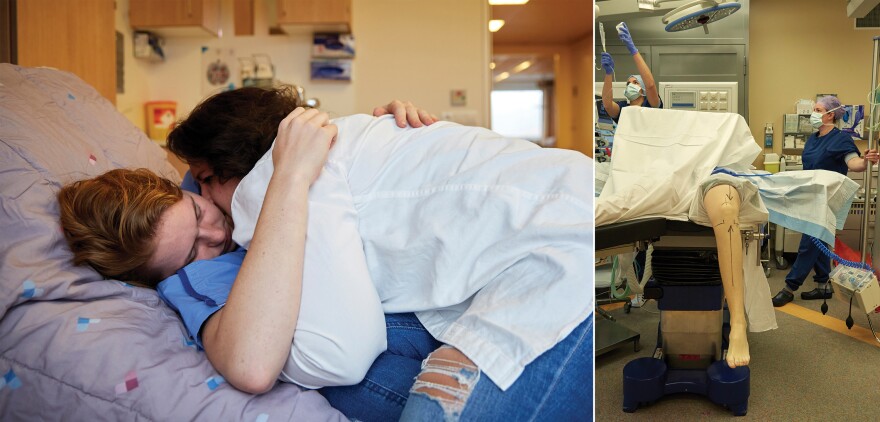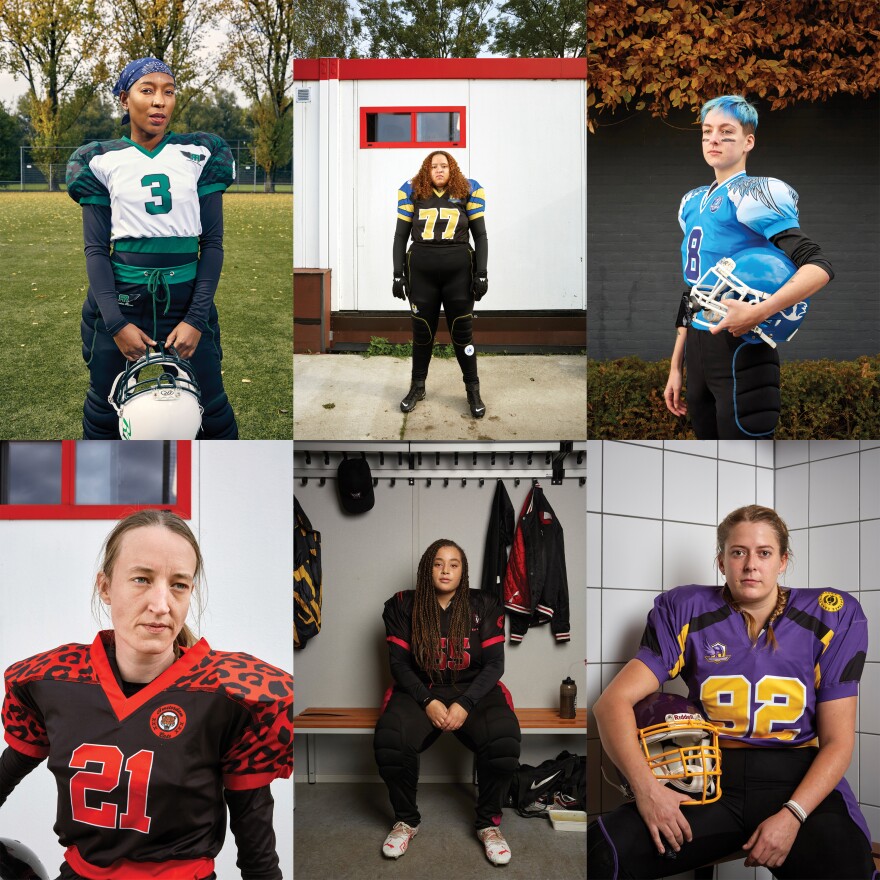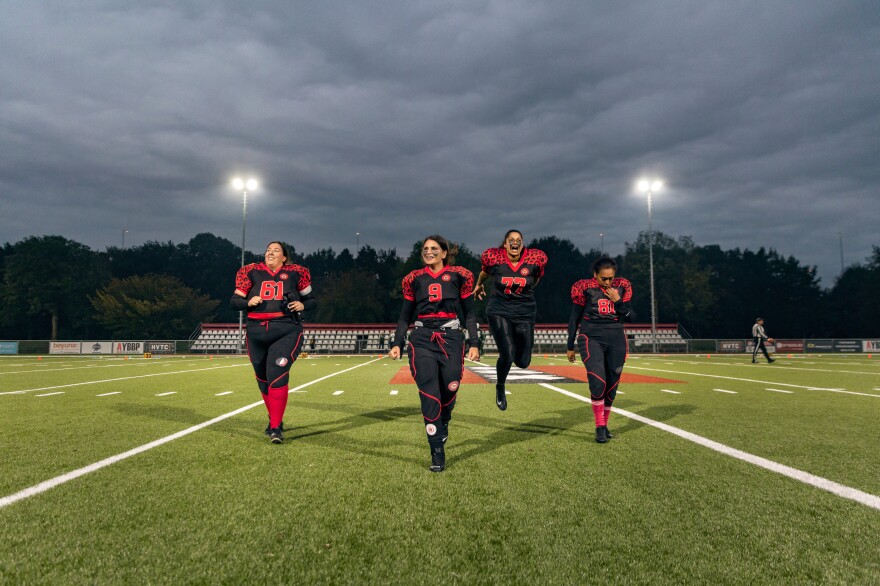Kelly de Waard was 6 years old when she experienced her first adrenaline rush.
Her father, an avid go-kart racer, had taken Kelly and her brother, Davy, to a local track in Lelystad, Netherlands, for their first-ever drive. Kelly's father built his own karts and was keen to have his son and daughter get behind the wheel as soon as they were able.
Davy went first and crashed quickly. Then it was Kelly's turn. Before her father could stop her, she'd pressed down hard on the gas. "It didn't occur to me to slow down," she remembers. She got three-quarters of the way around the circuit before she hit the tire-wall too.
"The rush I got when I crashed that go-kart is very similar to the body hits in American football," Kelly explained. "The impact makes me feel alive."
Any sport would do — as long as it gave her that same feeling; she was hooked.

Women's American football has had a tumultuous history in the United States, but women have been actively involved in the sport since the late 1880s.
For the past few decades, the sport has been quietly growing abroad too.
Canada, Mexico and Australia — all countries with close cultural ties to the U.S. — have active leagues and, by 2016, there were over 200 teams in Europe alone.
The Netherlands was the odd country out. Although there'd been a men's league in the country since the mid-'80s, there were no women's teams and no dedicated league. The only option for women like Kelly was to join a men's team, something that put many potential female players off.
The Queens Football League, founded by Kanessa Muluneh in 2017, was created in response to that lack of opportunity. Not interested in competing with men, Muluneh decided that if there was no league for women like her to join, she would start one.

Kelly began playing flag football with boys and, when she was 16, she joined a male American football team in Lelystad, her hometown. In addition to the rush, she found football to be a great outlet for the frustrated energy that always seemed to be ready to burst out of her.
Like many of the QFL's athletes, Kelly refused to accept that American football was a "man's sport." "Obviously, women can play — and it's important that we play," she says. "Breaking boundaries is what we do."
So at 18, she joined the Amsterdam Cats — the first of six teams in the now-defunct QFL, the only female American football league in the Netherlands.

Some women began their time in the QFL as rookies who discovered the league on social media and who had to learn the game from scratch. "I randomly came across the QFL online and went to one of the tryouts with a friend," Desi Wolf, a linebacker for the 0'30 Utrecht Wolverines and an avid surfer, recalls. "I was looking for a new challenge in life and I found it."
Tara Nijhoff, 35, a running back for the Zwolle Blue Jays, discovered the QFL on Facebook. "I knew I had to try it out — it felt special and unique. I didn't know anyone else who played it, and that was exciting."
Others, however, had been playing American football in men's teams and were frustrated by their experiences. "I was always on the bench because they'd choose all the boys before they picked me," Sitara Sheomber, a center guard for the Amsterdam Cats, remembers.

The league's athletes came from all walks of life: They were students, flight attendants, single mothers, dental hygienists and nurses. They taught math or designed clothes. For most, your age wasn't important.
Suriname's first female Thai boxing champion and a 51-year-old linebacker for the Rotterdam Ravens, Sushell Ramadhin says "age is subjective — I feel young inside."

Players paid monthly dues of about $30 and, in return, they received two training sessions per week and access to a season's worth of games. They were coached by volunteers — all current or former male American football players and coaches.

Some quickly discovered that the extreme physicality of the sport and the often grueling training sessions weren't for them. But many fell in love with the game.
"I wasn't sure if this is really my thing, but once I caught my first ball, I knew — this is it," recalls Lisa Niekoop, 31, a tight-end for the Ravens.
Although the league's athletes weren't professionals, their injuries — concussions, torn ligaments, dislocated shoulders — were often serious. Games were frequently forfeited as teams struggled to find replacements for their injured players.

Despite the risk of injury, for many, American football was the perfect outlet. High-impact and high-energy yet strategic and regimented, the sport offered the right combination of intellectual and physical challenge.
As a quarterback, Kelly learned how to master the calling of plays, and she loved leading her team — Kelly and the Cats had a 100% win rate and never lost a game to a Dutch team in the Netherlands since the league got its start in 2017.
For others, the routine and discipline helped them cope with mental health issues. Laila Zwier, 21, a receiver for the Blue Jays who goes by they/them pronouns, suffers from chronic depression and was looking for something to provide them with daily structure and a sense of purpose.

A big draw for players is that, unlike the more traditionally popular Dutch sports of soccer, field hockey or volleyball, American football requires women of all sizes. "It's a team sport with a different sense of body culture," explains Claudia Overkleeft, 28, a right guard for the Eindhoven Valkyries.
By the middle of 2020, the league had six teams — the Cats, the Ravens, the Blue Jays, the Valkyries, the Hague Black Scorpions and the Wolverines — and the coming season held the exciting prospect of proper competition.

Then, when the pandemic hit, everything ground to a halt.
First, fans were barred from attending games and players had to play in front of empty bleachers. Then, on Oct. 13, 2020, the government banned team sports entirely and the league was put on hold. Players were left to try and stay in shape by training at home or on a nearby field with another teammate or two.

"It was difficult," Nijhoff explains. "We trained outside on our own — there were no more gyms. We even attended Zoom classes with the team. But we all tried to keep fit somehow."
Kelly kept fit by training with her boyfriend and coach, Jordi Anröchte, himself a player with the Crusaders, Amsterdam's male American football team.

Cats rookie Joanne Limm, 36, said when team sports were allowed again — on March 3, 2021 — it was anything but straightforward. "The rules said only players under 26 — as if being 28 means COVID-19 will hit you harder. You could exercise together, but you had to keep 5 feet of distance." American football is a body-contact sport, making the lockdown regulations largely unworkable.
Eventually, on Sept. 12, 2021, after 11 long months, the QFL was able to restart. But teams were faced with plenty of absences. One was Dominique Sjerps, the promising rookie quarterback for the Blue Jays, who'd torn several ligaments in her knee during training and would sit out the entire 2021-2022 season.
As the new season wore on, Kelly too began to suffer from an old knee injury, something she'd hidden from her coaches, as she didn't want to be benched. Things came to a head on Oct. 31, 2021, in a game against the Valkyries. Kelly had to be taken out after it was clear she was in serious pain and could no longer play. Although she didn't know it yet, it would be the final game of her career.

With Kelly out, it was time for Rufina Michels-Mastail, 40, to step up. "It was scary for me on the field, filling in for Kelly, but we pulled it off with a great play and, in overtime, I even got to run the ball for a touchdown."
When it became clear that Kelly would not be returning to the team because of her injury, Michels-Mastail assumed the role permanently, and with Kelly cheering from the sidelines, the Cats won their third Queens Bowl (the QFL's version of the Super Bowl), beating the Ravens 19-6.

At the end of February 2022, just when things looked like they were getting back to normal and as the teams were preparing for the new season, players received a video message from Muluneh, QFL's founder, announcing that she was shutting down the league and moving to Dubai. In its place, a new organization, the Women's Football League would take over, led by Ravens head coach Wesley Kuils and Miguel Alfarez, the Cats' former head coach.
As the news spread, teams lost players who were already frustrated with the repeated lockdowns while being expected to pay their monthly dues despite not being able to play or practice. The Wolverines decided, as a team, not to join the WFL and instead merged with the city's male team, the Utrecht Dominators. The Black Scorpions, already low on players, joined the The Hague Raiders 99.

WFL managed to keep four teams in the league, though — the Cats, the Ravens, the Valkyries and the Blue Jays — and recruited or transferred around 80 players from the QFL. On Sept. 18, the WFL officially launched their first season with a kick-off game between the Cats and the Blue Jays, which the Cats won 26-0.
For the WFL, the new season is a fresh start; a new league with a first and second division. Where the QFL was a for-profit company with Muluneh at the helm, the WFL is a nonprofit led by a board of trustees as well as a players' guild. Most exciting for the athletes, there is talk of an all-star team that will compete internationally.
For others, the end of the QFL signaled the start of a new path. For Ria Stephanie, running back for the Blue Jays, football was just a hobby. She felt she wasn't doing the team justice by staying.
Although she'll continue to stay involved in the WFL as a quarterback coach for the Cats, Kelly is also looking ahead. She's found a job at KLM Royal Dutch Airlines, she changed her major to Business Law, and she's moving in with Anröchte.
There's even a plan in the works to return to her first love: racing. But first, her father needs to build her a new go-kart.

Catie Dull photo edited and Zach Thompson copy edited this story.
Nick Schonfeld is an award-winning advertising writer. In 2015, he quit his job and now divides his time between writing children's books and working on stories about affordable health care, gender equality, education and social justice.
See more of Julia Gunther's work on her website or follow her on Instagram: @juliagunther_photography.
Copyright 2023 NPR. To see more, visit https://www.npr.org.







